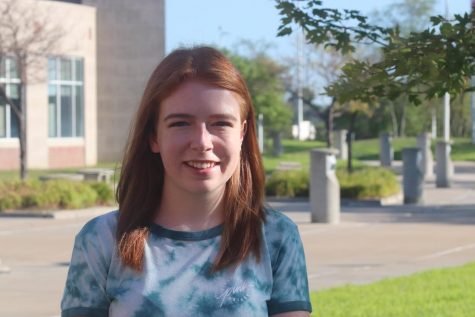Eight days of love and light
Jews celebrate Hanukkah
Photo courtesy of Abby Friedland
A young Friedland lights her hanukkiah. “I was raised Jewish so I have celebrated it [Hanukkah] since I was a baby,” junior Abby Friedland said. “Hanukkah, to me, is just family time, like many who celebrate Christmas. It’s a good way to feel connected to those around you.”
December 7, 2020
Dreidels and menorahs—recognizable terms, yet since the majority of Americans celebrate winter-time holidays like Christmas, their meaning and the meaning behind the associated Jewish holiday, Hanukkah, may not be as well known.
The Hebrew word “Hanukkah” means “dedication” which is a fitting name for a holiday that commemorates the reclaimed and rededicated Holy Temple from the Greeks in the second century BCE. The holiday also remembers a miracle: the miracle of a small quantity of oil that kept the Holy Temple’s hanukkiah (commonly called a menorah) lit for eight days. Thus, the celebration lasts eight days and begins, this year, on December 10.
Due to the season of which Hanukkah falls, some falsely believe it to be an interpretation of other culture’s holidays.
“I think a lot of people—and a part of this is because of the proximity Hanukkah has to Christmas on the calendar—assume that it is the ‘Jewish Christmas,’” Ben Cohen, the Youth Engagement Coordinator at Omaha’s Temple Israel, said. “They celebrate very different things. Here [in America] we talk about it as being a festival of lights; gathering, spending time with family, bringing light into the world and creating positive impacts on those around us.”
Still, many don’t realize that Hanukkah is one of the more minor Jewish holidays. Though Hanukkah is no doubt a day for celebration and reflection, holidays such as Passover which celebrates Jews’ liberation from slavery in Egypt, Rosh Hashanah, their Jewish New Year, and Yom Kippur, their Day of Atonement, all carry a more significant importance in Judaism.
“There isn’t that much to Hanukkah,” junior Abby Friedland said. “We just go about our days and when it’s present time, we say the prayer and open our presents. My family does themes of presents for each of the eight nights. For instance, this year we have ‘winter clothes night,’ ‘game night,’ ‘what you really want night,’ etc. It gives a bit of spice to our nights and makes it a bit easier to shop.”
Although gift-giving isn’t a traditional part of Hanukkah, to Friedland and others it’s a good way to feel connected to friends and family in the Jewish community.
One thing that remains the same, however, is the lighting of the eight-branched candelabra called the hanukkiah (often referred to as a menorah, which traditionally only has seven branches). The hanukkiah holds four candles on each side of the shamash (the middle candle). Each night a candle is placed, beginning from right to left, and then lit with the shamash going from left to right.
The traditional Hanukkah food is also a staple at Jewish households like Friedland’s. Most of the featured foods are fried in oil, in reference to the miracle of the oil. For some, the holiday favorite is the sufganiyot or jelly donut. Others prefer a spin on meat and potatoes.
“We eat latkes, which are basically hashbrowns but ten times better, and gelt, which are chocolate coins,” Friedland said. “My family normally eats a lot of roast beef, too. My favorite part of Hanukkah is definitely the food.”
The saying goes that good food and good company are two of life’s simplest pleasures. This year, however, having company and loved ones over only poses a risk to people’s health and safety.
“I can tell you that celebrating the holidays with family and friends makes all the difference and makes the day or multiple days—depending on the holiday—very special,” Anna Melnikoff, a friend Friedland met at a Jewish summer camp, said. “Unfortunately, because of the pandemic, I do think a lot of people are not going to be able to travel or get together with their families for the holidays. I know that my family is going to be doing virtual most likely. It’s a difficult time, and none of us really know how to handle it.”
But people within the Jewish faith remain resilient and will no doubt make the most of the situation.
Temple Israel, in fact, will be hosting a parking lot Hanukkah celebration. They plan to light a huge menorah that everyone can view from the safety of their cars, proving that (socially distanced) human connection can outshine anything from pandemics to religious prejudice and spread love and light.

![A young Friedland lights her hanukkiah. “I was raised Jewish so I have celebrated it [Hanukkah] since I was a baby,” junior Abby Friedland said. “Hanukkah, to me, is just family time, like many who celebrate Christmas. It’s a good way to feel connected to those around you.”](https://millardwestcatalyst.com/wp-content/uploads/2020/12/image0.jpeg)





